How to prepare before your first triathlon?

- 1. Understanding the Basics of Triathlon
- - Triathlon 101: An Overview
- - The Three Sports in One: Swim, Bike, Run
- - Essential Rules and Regulations to Know
- 2. Training for Your First Triathlon
- - Developing a Suitable Training Plan
- - Importance of Cross-Training in Triathlon
- - Adapting Your Body to Intense Workouts
- - Rest and Recovery: An Integral Part of Training
- 3. Essential Equipment for Triathlon
- - Gear for the Three Stages: Swim, Bike, Run
- - How to Choose the Right Equipment
- - Caring for Your Triathlon Gear
- 4. Nutrition and Hydration for Triathletes
- - Importance of a Balanced Diet for Triathletes
- - Hydration before, during, and after the Race
- - Race Day Nutrition Advice
- 5. Preparing Mentally for Your First Triathlon
- - Overcoming Pre-Race Jitters
- - Strategies for Developing a Positive Mindset
- - Visualisation Techniques for Triathletes
- 6. Practical Tips for Race Day
- - Understanding the Race Course
- - The Importance of Pacing Yourself in a Triathlon
- - Dealing with Possible Race Day Difficulties
- 7. Post-Triathlon Recovery
1. Understanding the Basics of Triathlon
Diving headfirst into the world of triathlons can seem overwhelming, but let's unravel the basics. A triathlon is a three-pronged athletic contest that involves swimming, cycling, and running in rapid succession. It's a test of not just physical prowess but grit, endurance, and mental fortitude. It's fascinating because it melds a trio of disciplines that challenge your body in varied yet compelling ways. Remember, the rules of the game are indispensable in your journey. No two triathlons are alike, with differing distances and unique protocols, but your will to outdo your limits remains the universal rule. Undoubtedly, beginning your triathlon journey marks the first step towards an extraordinary universality of sporting aptitude.
- Triathlon 101: An Overview
Diving right into Triathlon 101, an interesting world of endurance and perseverance waiting for triathlon newcomers. So, what is a triathlon, you may wonder? Essentially, it's a multi-stage competition that involves the completion of three continuous and sequential endurance disciplines. Known for its gruelling combination of swimming, cycling, and running, a triathlon is the ultimate fitness test, no doubt. This unique blend of sports not only challenges your strength and endurance, but also your mental tenacity. From pushing past the frigid waters in the swimming stage to enduring the tireless cycling course, and finally, to the energy-draining run, a triathlon is no walk in the park. But fear not, the rewards are well worth the challenge. In essence, a triathlon offers the chance to master three separate disciplines, whilst engaging your whole body and mind in the process. The experience is invigorating, humbling, and absolutely thrilling. And the adrenaline rush, oh, it's unrivaled! But remember, it's not just about the finish line — it's equally about the journey getting there. So, strap on your helmet, lace up your running shoes, and dive into the inspiring world of triathlon. Are you ready for the ultimate test of endurance?
- The Three Sports in One: Swim, Bike, Run
Triathlon, an irresistible array of sport caters to those hungry for diversity and challenge in their fitness routines. Comprising three distinct activities - swimming, cycling, and running, the beauty of this unique sporting event is the seamless transition from one activity to another. Begin with a vigorous swim - a full-body workout that challenges your lungs, promotes cardiovascular health, and strengthens almost every muscle in your body. From the open water, you pivot to the cycling stage. Here your lower body takes center stage as your quadriceps, hamstrings, and glutes power you through the course. Balance, agility, and endurance - cycling demands it all. Finally, the marathon - the most grueling section of the triathlon. But by now, your body is a well-oiled machine, primed to conquer the final stretch. This high-intensity run tests your mental grit just as much as your physical stamina, solidifying its stand as a fitting finale to the incredible test of human endurance the triathlon encapsulates. A triathlon isn't just about swimming, cycling, and running. It's a symphony of strength, perseverance, and indomitable spirit. It's about pushing your body to the limit and then realizing - that was just the beginning. Isn't it time you embraced the challenge?
- Essential Rules and Regulations to Know
If you're someone who's earnestly looking to step into the world of triathlons, understanding the essential rules and regulations is a launch-pad requirement. Ensuring you’ve mastered the rules can be the difference between a disqualification and securing a podium finish. Now, the foremost regulation revolves around the immaculate safety of all participants. That means, donning approved helmets during the cycling section and strictly adhering to marked paths during the running stage are non-negotiables. In the swimming stage, touching the bottom of the body of water or holding onto any stationary object is prohibited. Additionally, competing with any audio device is a big no-no! Also note, unsportsmanlike conduct, including blocking or impeding fellow triathletes can lead to disqualifications. Other critical rules to bear in mind are to refrain from littering, accept outside help, and most interestingly, drafting – riding behind another cyclist to take advantage of their slipstream which is strictly disallowed in most races. Remember, rules aren't there to restrict, but to love and safeguard the spirit of this wonderful sport! So take your time to understand the unique set of rules in each race you enter - as they do vary with organizers - and keep that winning attitude ignited!
2. Training for Your First Triathlon
You're stepping into the world of triathlons, right? Welcome to a journey that's going to test your limits and reward you with unbeatable pride. As the first step, creating a solid training plan is a must. Each triathlon sport- swimming, biking, and running, requires different sets of skills and endurance levels and prepares your body for a variety of challenges, so finding the balance is crucial. Remember, your schedule should be flexible to accommodate rest days; yes, rest is as important as your intense workouts! It's about helping your muscles recover and adapt to your new physical demands. So ready to sweat, rest, repeat?
- Developing a Suitable Training Plan
Developing a suitable training plan for your first triathlon can seem like a daunting task. However, with the right guidance and a bit of perseverance, it's certainly achievable. One of the first things to remember is that triathlon is an endurance sport that incorporates three very different physical activities. Therefore, your training must be all-encompassing. You need to allocate specific time for swimming, biking and running, ensuring each gets the focus it requires. In your plan, make sure to gradually increase the intensity of your workouts. This could involve lengthening the distance or the duration on a week-by-week basis. Do what suits your existing fitness level and boost from there. However, beware of overdoing it. Listening to your body is crucial. If you feel excessive fatigue, aches or pain, it may be your body signaling that it needs rest. Additionally, your training plan should also include rest days. Give your body the chance to recover and adapt to the new regime. Training for a triathlon is not all about physical exertion, it's about growth too. On these rest days, remember to hydrate and consume a balanced diet – it will boost the recovery process. After all, a superior training plan considers not just the workout, but nutrition and adequate rest too. Lastly, don't just stick to your plan rigidly. Be flexible and adjust the plan as needed based on your progress and how your body is responding. Remember, the end goal is to participate and finish the triathlon, not to overtrain and exhaust yourself before stepping foot on the starting line. In conclusion, developing a suitable plan is technically about devising a strategy that covers all bases- Training, Nutrition and Rest.
- Importance of Cross-Training in Triathlon
Cross-training plays a crucial role in triathlon training, offering several benefits that help to maximize your performance. Essentially, cross-training involves incorporating exercises from different physical disciplines into your triathlon training schedule. Rather than just swimming, cycling, and running, you might also engage in activities like yoga, strength training, or even dance classes. The variety in exercises not only helps prevent the risk of overuse injuries common amongst triathletes, but it also aids in building strength and flexibility in muscles that are otherwise not used in strict triathlon training. This way, cross-training makes you a well-rounded athlete, offering the enhanced resilience and agility necessary for tackling the diverse physical demands of a triathlon. Moreover, mixing up your workout routine serves as a tremendous psychological benefit, preventing burnout and boredom that often come with the monotonous routine. Remember, staying mentally fresh is just as crucial as physical fitness! Lastly, cross-training provides an advantage on those inevitable days when you can't stick to your regular training plan. If it's rainy outside, you can still hit the gym for strength training. So, don't see cross-training as an optional extra but as a fundamental aspect of your triathlon training journey. It’s clear - the value of cross-training in triathlon training is just too significant to overlook.
- Adapting Your Body to Intense Workouts
Becoming a triathlete is a challenging endeavor that requires adapting your body to intense workouts. But how exactly can we efficiently transform our bodies for the rigors of the three-stage sport? It's not just about hitting the gym or running as fast as you can-- it's about the intelligently designed, purposeful commitment to a holistic routine. The triathlon commands a distinct blend of strength, stamina, and resilience, and so should your training. Your workout regimen has to be multifaceted, incorporating swimming, cycling, and running exercises, all tailored to your body's limits and your race goals. Consider starting with lower intensity workouts then gradually progress to harder regimes. This method, called progressive overload, is a surefire strategy to effectively condition your body to a higher level of stress without causing injury. Moreover, ensure that your workouts include a mixture of aerobic and anaerobic exercises. While aerobic exercises build your endurance--a crucial aspect in racing--anaerobic exercises are designed to boost your speed and power, equally significant in triathlons. Lastly, don't forget to listen to your body. Some aches, pains, and fatigue are normal; however, pay attention to signals of extreme discomfort. Keep in mind that the objective of any exercise is to build your body up, not break it down. So, be patient, be persistent, and healthily adapt your body to intense workouts.
- Rest and Recovery: An Integral Part of Training
It's easy to underestimate the significance of rest and recovery in your triathlon training. Many budding triathletes are motivated by a go-getter mentality, believing that the more they train, the better they'll perform. However, in reality, this is far from the truth. Without adequate rest and recovery, your body is denied the vital opportunity to recuperate and rebuild muscles, ultimately leading to reduced performance and potential injury. Recovery should, therefore, be considered an integral component of your training plan. Rest days are not "lost training days" but valuable periods for your body to repair and strengthen itself. Moreover, rest is not solely about physical recovery. Mental fatigue is a real concern for triathletes, and providing your mind with a break is just as essential. Proper sleep is also part of your recovery. You should aim for at least 7 hours a night, although requirements will vary between individuals. Remember, a tired athlete is not a sharp athlete. Embrace the process of recovery as much as you do the feeling of pushing your boundaries, knowing that by doing so, you give your body and mind the chance to return stronger. Treat it like your secret weapon in becoming the best triathlete you can be.
3. Essential Equipment for Triathlon
Embarking on your triathlon journey, the essential gear for each of the three stages - swimming, biking, and running, shouldn’t be overlooked. Choosing the right triathlon equipment can impact your performance and comfort throughout the race. For swimming, invest in a snug-fitting swimsuit, goggles, and a quality wetsuit for colder waters. When it comes to cycling, a reliable and well-maintained bike, helmet, and cycling shoes are integral. Lastly, for the final stage, a good pair of running shoes and breathable clothing can make a difference. Remember, it's not just about having the gear but also knowing how to maintain them for longevity. Got your checklist ready?
- Gear for the Three Stages: Swim, Bike, Run
Triathlon, a multi-stage sports competition, demands a lot from its participants. Not just physically and mentally, but it also calls for the right and apt set of gears to ensure productivity, ease, and safety. The three pivotal stages of triathlon: Swim, Bike, Run, each has its unique set of gears that a triathlete must be well-equipped with, to thrive in the competition. For the swimming stage, your essentials should include a triathlon-specific wetsuit that ensures flexibility, buoyancy and comfort, a pair of breathable goggles, and a performance-engineered swimming cap. Transitioning to the biking phase, a well-fitted helmet and a specialized triathlon bike that provides speed and comfort are critical. Don't forget proper cycling shoes and a quality pair of sunglasses for protection against outdoor elements. Lastly, the running phase demands a durable and comfortable pair of running shoes, along with moisture-wicking clothing to facilitate breathability and movement. Investing in quality gear not just amplifies your performance but also plays a strategic role in preventing potential injuries. As you gear up for your triathlon journey, remember - using the right gear is as important as performing right. Gear up, train hard, and remember, the finish line is just the start of a whole new race!
- How to Choose the Right Equipment
When preparing for a triathlon, it's essential that you choose the right equipment. It's not just about what suits your style, but also what enhances your performance and comfort. Don't pick gear based on what looks appealing or trendy. Triathlon training is tough, and your gear needs to be up to that task. Start by doing your research. Understand the requirements of each sport in the triathlon and the purpose of each piece of equipment. Then, consider your personal needs. Do you have a specific running style that requires particular shoes? Or, do you have a preference for a certain type of bike? Understanding your individual physical needs will help you make the best decision. Once you've evaluated your needs, don't rush into buying the most expensive gear. Instead, shop around. Read reviews, seek advice from fellow triathletes, and carefully consider your options before making a final decision. Remember: buying equipment for a triathlon is an investment – make sure you're getting your money's worth. Lastly, never compromise on safety. Regardless of the pricing or brand, your equipment must meet all safety standards. Because in the end, triathlon is about testing your limits and challenging yourself, but it's certainly not worth putting your safety at stake.
- Caring for Your Triathlon Gear
Caring for your triathlon gear is vitally important and involves some simple yet essential steps. First, you should always clean your equipment after each training session or race. Whether it's your swimming goggles, cycling helmet, or running shoes, ensuring they are free from dirt and sweat will enhance their longevity. Remember, neglecting to clean your gear can lead to wear and tear, negatively affecting its performance and your game. Next, proper storage of your equipment is crucial. Avoid harsh environments that could damage your gear. For instance, your bike should be kept in a cool, dry place to prevent rusting, while your running shoes should be kept away from heat sources to prevent the materials from warping. Regular maintenance is another must. Just like a car needs a regular oil change, your bike needs periodic services to keep it running smoothly. Even your running shoes and swimming gear, though less technical, require periodic checks for signs of wear and tear. Whether you are gearing up for your first event or are a seasoned triathlete, caring for your gear should be as much a part of your routine as training. Remember, efficient gear leads to an efficient performance. By keeping your equipment in top shape, you aren't just preserving your investment; you're also making strides towards your next finish line.
4. Nutrition and Hydration for Triathletes
Nutrition and hydration play a crucial role in your triathlon journey. It's not just about the training - it's about fueling your body correctly for optimum performance. Triathletes need a balanced diet rich in proteins, carbohydrates, and healthy fats to boost energy and repair muscles. It's not just eating right but also staying hydrated that aids in the performance and recovery phases. The value of water and electrolytes cannot be underestimated. They help maintain muscle function, control body temperature, and prevent cramping. Remember, every sip counts! So, how about experimenting with some easy-to-carry hydrating solutions on your next training run? Don’t overlook the power of good nutrition and smart hydration. It's like the hidden fourth leg of your triathlon!
- Importance of a Balanced Diet for Triathletes
**The importance of a balanced diet for triathletes** cannot be overstated. Fueling your body correctly impacts not only your performance but also your recovery. As a triathlete, you will be taxing your body in three rigorous disciplines: swimming, cycling, and running. Each of these demands a unique set of nutritional requirements. Consuming a balance of carbohydrates, proteins, and healthy fats is crucial. Carbohydrates serve as your energy powerhouse, essential for sustaining the long bouts of endurance necessary for triathlon success. Proteins, on the other hand, aid in the repair and growth of muscle tissue, something vital after intensive workouts. And let's not forget the equally important healthy fats. Despite the stigma surrounding fats, they are fundamental in absorbing vitamins, protecting your vital organs, and providing a reserve of energy. Remember, your body is akin to a high-performance vehicle. Would you consider fueling a Ferrari with low-grade gas? Probably not. Similarly, for your body to perform at its peak in a triathlon, it requires premium fuel: a well-balanced, nutrient-dense diet. Of course, nutritional needs will vary amongst individuals, but the golden rule remains - balance is key. Keep this in mind, and you're one giant stride closer to acing your triathlon. Do you give your body the premium fuel it deserves?
- Hydration before, during, and after the Race
Hydration is a critical component in a triathlon athlete's training and competition routine. Proper hydration before, during, and after a race is an indispensable aspect of success in such physical demanding ventures. Prior to the race, it is crucial to ensure you are adequately hydrated. The pre-race hydration phase is all about creating a hydration balance that will carry you through the demanding activity. During the race, hydration becomes even more critical. The amount of energy exuded in triathlons results in significant fluid and electrolyte losses through sweating, which requires the competitors to hydrate actively while racing. The aim here isn't just to replace lost fluids, but to keep your body functioning optimally under extreme pressure. Some athletes employ tactics such as carrying water bottles on their bikes or making quick pit stops at hydration stations during the run. Finally, the post-race hydration is meant to replenish any lost fluids and electrolytes during the recovery process. It can often be overlooked but is equally vital to a triathlon competitor's overall health and subsequent performance. In conclusion, proper hydration integrates vigilance and method, which ultimately factors into an athlete's success in triathlon races. It is absolutely crucial not only for optimising physical performance, but also for safeguarding health during both training and competition.
- Race Day Nutrition Advice
Fueling your body correctly on race day is unequivocally vital for an optimal performance in a triathlon. Each segment of the race - swimming, cycling, and running - significantly drains your physical energy stores. Hence, knowing what, when, and how much to eat can create a noticeable impact on your race performance. Carbohydrates are your body's main energy source during high intensity activities, hence, consider taking a balanced meal rich in complex carbohydrates, moderate in protein and low in fat 2-3 hours before the start of the race. Hydration, too, carries immense importance. Along with water, you should also consider replenishing electrolytes by sipping on sports drinks. Remember, even slight dehydration can negatively affect your performance. Avoid any new dietary items on race day as it might upset your stomach. Instead, stick to what your body is familiar with. Lastly, energy gels or bars could be consumed during the race for an extra energy boost. These quick recommendations shall propel you toward maintaining a steady energy level during your race. Got it all? Now you're one step closer to dominating your first triathlon. Note: It's always advisable to consult with a sports nutritionist for a personalized nutrition plan.
5. Preparing Mentally for Your First Triathlon
Preparing mentally for your first triathlon is as critical as physical training. Nervousness can significantly impact your performance, but remember, it's completely normal to feel jitters before a big event. The trick is to harness this energy positively. Develop a robust mindset, focusing on the reason behind your participation. Is it to push your limits or to enjoy a healthier lifestyle? Having a clear purpose can motivate you immensely. Also, don't underestimate the power of visualization. Imagine yourself gliding through the water, riding your bike with strength and determination, and crossing the finish line with a triumphant run. This mental rehearsal can instill confidence and improve your performance on race day.
- Overcoming Pre-Race Jitters
A triathlon is certainly no easy feat and it is quite common to experience pre-race jitters. These palpitations can be overwhelming and may even lead to underperformance, but fear not. You have the capacity to overcome this anxiety and confidently face the challenge ahead. The first step is acceptance. Understand that it is completely normal to feel a bit uneasy before a big race. After all, you have been diligently preparing for this day, haven't you? It's the anticipation of the unknown that often triggers anxiety. By accepting your feelings, you can start working towards managing them rather than let them control you. Consider such jitters as an indication of your readiness. It’s your body’s way of telling you that it is geared up for the impending event. Meditation and deep-breathing exercises can also significantly help reduce your stress levels. Calming your mind can indeed calm your body. Simultaneously, try to visualize your success. Picture yourself crossing the finish line. This will help you focus on your goal and keep distracting thoughts at bay. Remember, it's okay to feel nervous before a triathlon. What's more important is not to let these jitters hinder your performance. Instead, let them fuel your determination to succeed!
- Strategies for Developing a Positive Mindset
When you brave the thrilling sport of triathlon, it's not just about your physical prowess but also your mental fortitude. To triumph over such a fierce competition, you must harness a positive mindset to power through. So, how can you go about it? Firstly, replacing self-doubt with self-belief is vital. Instill confidence in yourself by focusing on your training progress and recalling your past successes. It's easy to get bogged down with apprehension but remember, confidence is a choice. Choose to be positive. A wise strategy is to create mental 'highlight reels'. Visualize your perfect race, from the energetic start through to the exhilarating finish. Picture overcoming obstacles with grace and strength. This mental rehearsal can boost your confidence as well as prepare you for potential challenges. Finally, incorporate positive affirmations in your daily routine. Positive affirmations like "I am strong, I've got this," can significantly elevate your self-assurance. Research even points out that such optimistic thinking can even improve performance. In the words of Henry Ford, "Whether you think you can, or you think you can't--you're right." Plunge into your triathlon journey with a positive mindset, and you'll be surprised how far it pushes you.
- Visualisation Techniques for Triathletes
Visualisation plays a pivotal role in preparing for events such as a triathlon. A technique often used by top athletes, it involves creating a mental image of what you want to happen or feel during the actual race. It’s not just about seeing yourself cross the finish line. It's considering the race in its entirety - the start, the transitions, and how to face potential challenges like fatigue or unexpected weather conditions. Where does this technique find its footing? In the mind–body relationship. The mental images will convey to your body how it feels to perform in the optimum way, even when your body is physically not executing the task. This mental rehearsal helps improve your efficiency and reinforces muscle memory. Start with some quiet and focus. Close your eyes and perceive yourself swimming smoothly, shifting gears on your bike effortlessly, and enduring the run with sheer determination. Feel the rhythm of each stroke, pedal, and stride. Ponder the sensation of the water, the breeze, and the road under your feet. Don't forget the crowds cheering and that final stretch towards the finish line. Visualising these positive experiences will help boost your confidence and mental resilience during the most arduous parts of the race. Remember, triathlon isn't only about physical endurance, but also about mental perseverance, and having effective visualisation techniques on your side can significantly bolster your race performance.
6. Practical Tips for Race Day
Running a triathlon can be intimidating and exhilarating at the same time, especially if it's your first one. The key to navigating through it successfully lies in preparation. Understanding the race course is paramount. Don't be a stranger to the landscape. Get to know where you'll swim, peddle, and pace yourself. Speaking of pace, remember it’s not just about speed, but endurance too. Don't burn yourself out too early, conserve your energy to last through all three stages. Expect the unexpected. Even the best-laid plans may go awry. Weather changes, equipment malfunctions, injuries - be mentally prepared to deal with race day difficulties. Keep your head in the game and your spirits high, after all, it's not just the triumph, but also, the journey!
- Understanding the Race Course
A key factor to smooth sailing in any triathlon is undeniably understanding the race course. Whether experienced or a first-timer, every triathlete should take the time to know the ins and outs of the course. This is more than just memorizing the route; it involves understanding the terrain and conditions you'll be facing. Will you be swimming in an open sea or a closed pool? Is the bike route hilly or flat? Is the running track concrete or dirt? Devoting time to identify these details helps you to prepare better. For instance, if you're going to be swimming against a current, then practising in similar conditions can be highly beneficial. Similarly, if the bike route involves a lot of uphill climbs, tuning your training around increased pedal strength can give you an advantage. Simply put, when you know what you're up against, you can develop a strategy to tackle it. Remember, every racecourse carries its unique challenges; therefore, the more familiar you are with it, the more equipped you are to handle those peculiarities. It's about playing smart, foreseeing challenges, and adapting your training to meet them. So, buckle up, investigate, and get to know your race course - it could be a game-changer in your triathlon experience!
- The Importance of Pacing Yourself in a Triathlon
The art of pacing is a critical element in any triathlon; it essentially dictates how efficiently you utilize your energy reserves throughout the race. Understanding the importance of pacing yourself in a triathlon suggests that it's not about how fast you can complete each segment of the race, but rather, it's about maintaining a steady, sustainable pace that will prevent you from burning out too quickly. By sustaining a manageable tempo from the start to the finish line, you'll achieve a more successful performance overall. This workable pace ought to be determined during your training sessions, where your focus should be on consolidating a consistent rhythm for your swim, bike, and run segments. Your aim shouldn't be to match the speed of the fastest competitors, rather, it should be to find your individual rhythm which enables you to sustain and maximize your strength till the end. Underestimating the importance of pacing could lead to a quick depletion of your energy resources, leading to an inability to finish the race. Therefore, remember, in a triathlon, it's not always the fastest who triumph, but those who manage their energy reserves most effectively. The key takeaway? Pace yourself, it's a triathlon, not a sprint.
- Dealing with Possible Race Day Difficulties
Facing potential difficulties during the race day is one of the rampant realities that every triathlete encounters. From unexpected weather conditions to equipment failures, these can add an extra layer of stress to an already demanding event. Being well-prepared for these challenges can vastly improve your race experience and performance. One of the common problems that can occur is fatigue. Remember that it's totally normal to feel strained, given the intensity of the sport; hence, knowing your body and understanding its limit is vital. Another potential dilemma you may face is getting lost. It's essential to have a thorough understanding of the race course. Memorize the layout, take note of landmarks, and know where the transition areas are. Dealing with equipment malfunctions is also a typical race day difficulty. Regularly inspect your gear before race day to avoid any surprising inconveniences. Lastly, it’s important to be flexible and adaptable - you never know what race day will bring. Whether it's unexpected weather changes or a crowded field, try to stay calm and remind yourself of why you’re out there in the first place: to enjoy the triathlete journey. Being mentally resilient will help you overcome these unpredictable challenges.
7. Post-Triathlon Recovery
After crossing the triathlon finish line, recovery shouldn't be an afterthought. It's essential to respect your body's need to heal and rejuvenate. First off, keep in mind that recovery is not just about physical rest. You may want to have a massage to alleviate muscle soreness. Drinking plenty of water and consuming nutrient-rich foods aids your body in repairing tissues and resupplying lost energy. It's time to reflect on your triathlon performance too. Note down your strengths, areas that need improvement, and plan your training accordingly for future races. Remember, every race is a learning experience for the next!
- Understanding the Importance of Post-Triathlon Recovery
Understanding the importance of post-triathlon recovery is absolutely crucial for every triathlete. A triathlon is a demanding physical event that puts considerable strain on your body. Post-triathlon recovery is all about allowing your body to heal, replenish its energy stores and repair damaged tissues. It’s not simply about lying down and resting; it involves a range of practices, from rehydration and refuelling to gentle movements and getting sufficient sleep. Many first-time triathletes underestimate the recovery phase, but it's essential for maintaining long-term health and improving performance in future races. After crossing the finish line, a triathlete’s journey isn't over - successful recovery is the next critical step. By recognizing its importance, you give your body the respect it deserves after gruelling hours of intense effort. And remember, to truly reap the fruits of your achievement, you have to make sure you heal properly. Without careful recovery, you risk injury, overtraining, and burnout. So, do you take your post-triathlon recovery in stride, or do you tend to rush back into normal life? Hint: the former will likely lead to greater success in your future triathlon pursuits!
- Strategies for Speeding Up Recovery
Recovery is a crucial aspect of any intense physical activity and even more so in a triathlon where your body has been pushed to its limit across three strenuous disciplines. An effective recovery strategy enhances your body's ability to repair, leading to improved endurance, strength, and overall performance. One of the most critical aspects of speedy recovery is hydration. Replenishing your lost fluids should be your immediate post-race activity. Water is integral, but do consider sports drinks that offer a balance of electrolytes and simple sugars to expedite recovery. Next, heed your nutrition within the two-hour post-race window. It is the golden period when your muscles are the most receptive to glycogen, which is effectively the fuel of your muscles. An ideal recovery meal should have a ratio of 4:1 of carbs to protein. An often-overlooked strategy is getting adequate sleep. Sleep enhances muscle repair and growth hormones, so ensure you get a good night's sleep after the race. Lastly, consider active recovery strategies like light jogging, swimming, or cycling at a very low intensity. It aids in decreasing inflammation and improves flexibility. Remember, listening to your body is paramount above all strategies. If you feel a strain, rest. It's better to under-train than overdo.
- Reflecting on Your Race Performance and Preparing for Future Races
After crossing the finish line of your first triathlon, the real work begins - it's time to reflect on your race performance and prepare for future races. In the wake of such a tremendous physical feat, it might seem tempting to take a breather and ride the wave of your achievement. However, the most successful triathletes know that reflection and preparation are critical steps on their journey. Analyzing your performance isn't about dwelling on flaws. It's about acknowledging strengths and identifying areas for improvement. Ask yourself: Did you pace well, or did fatigue set in prematurely? How did your physical training hold up, and do you need to revisit your regimen? Be brutally honest with your assessment – but give praise where it's due. It's vital to acknowledge both your triumphs and your setbacks. Remember, there's no failure in triathlon so long as you learn from every race. As you begin preparing for future races, break your overall goal into smaller, manageable targets. This approach will keep you focused and motivated. Experiment with different training methods, seek advice from more experienced triathletes, and never stop learning. Finally, embrace a growth mindset. Accept that you're a work in progress, and becoming a proficient triathlete is a journey mapped with consistent hard work and determination. Be patient with your progress, and most importantly, never lose sight of why you started. After all, the joy in triathlon lies in the journey as much as it does the finish line.
In conclusion, preparing for your first triathlon involves understanding the fundamentals of the sport, consistent and diverse training, procuring the appropriate equipment, maintaining healthy nutritional habits, and developing solid mental resilience. Race day requires strategic planning, while post-race emphasizes effective recovery. Following these guidelines will ensure not only a physically ready but also a mentally prepared first-time triathlete, capable of handling the unique challenges of a triathlon and achieving commendable race performance.
How long should my triathlon training plan be?
A beginner's plan usually lasts for 12-14 weeks, giving your body ample time to prepare for each stage of the triathlon.
Is it necessary to cross-train for a triathlon?
Yes, cross-training is important to build overall fitness, reduce the risk of injury and improve your performance across all three disciplines.
What kind of gear do I need for a triathlon?
You’ll need a swimsuit, wetsuit, goggles, bike, helmet, cycling shoes, running shoes, and attire suitable for both cycling and running.
How should I hydrate during a triathlon?
Covertly carry a water bottle on the bike and consume electrolyte drinks at aid stations during the run.
How can I mentally prepare for my first triathlon?
Overcome pre-race nerves by visualization and positive self-talk, and get familiar with the course before race day.
Why is pacing important in a triathlon?
Pacing helps conserve energy for the final stages of the race so that you can finish strong.
How do I recover after a triathlon?
Post-race recovery could include rest, nutrition, gentle movement, and reflecting on your performance to prepare for future races.










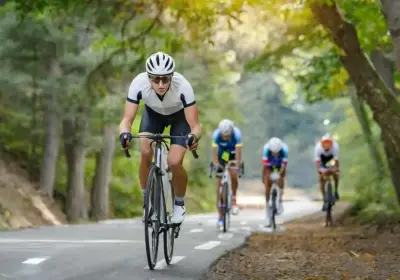


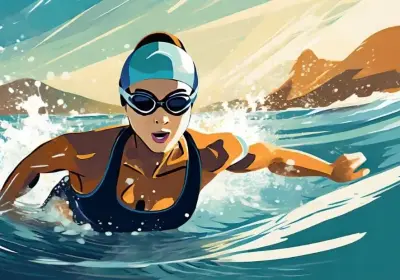
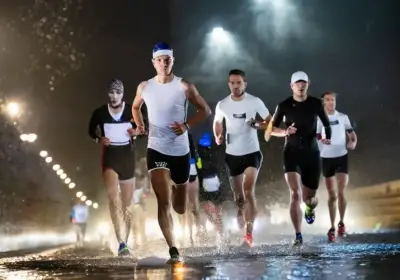


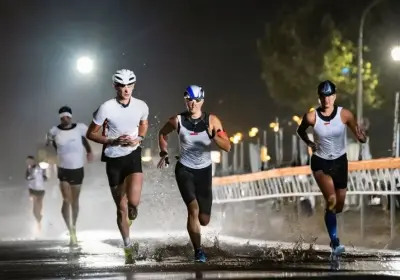






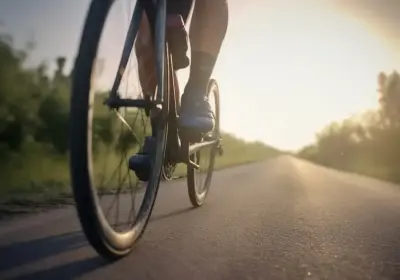
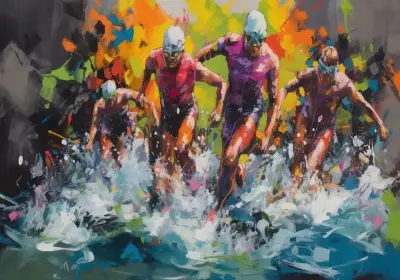

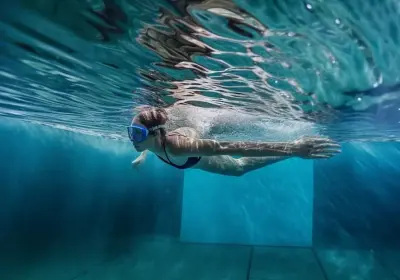
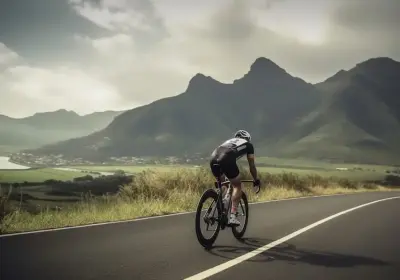
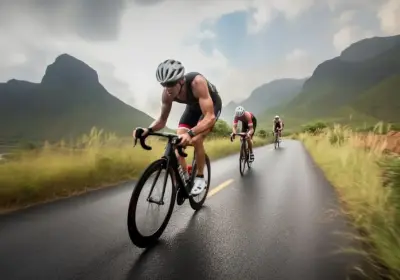








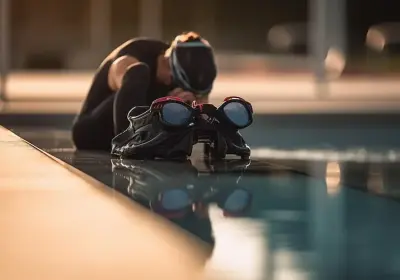
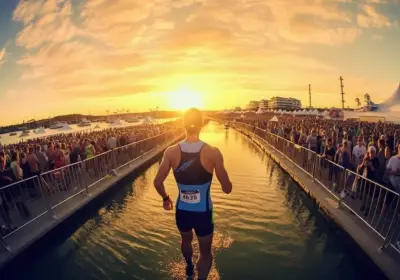










Leave a comment